|
I personally believe that life purpose is something we remember from a spiritual perspective rather than something we create. Of course, this depends on a person’s beliefs, and their viewpoint may differ. For me, I remembered my purpose when I discovered my passion—helping and motivating others to reach their full potential. I believe my purpose was already determined before I was born, but it remained dormant or was gradually unfolding as I matured. When the time was right, I became aware of it, understood it, and eventually began embodying it. This process has been gradual, but now my purpose is very clear to me: to learn, to experience, and to serve others. I believe there was a reason for me to come back to Earth, meaning my purpose was already determined before birth. Once my soul defined this purpose, it had to manifest it into reality—into a physical form—so I was born with this purpose written inside me. But here’s the key: It’s not that you are looking for your purpose. Your purpose has always been guiding you. We often think of purpose as something we must actively seek, as if it’s hidden somewhere outside of us. But in reality, our purpose is always present, subtly directing us through our experiences, passions, and even challenges. The process of life itself is designed to help us remember and align with it. An Analogy: The Meeting of Forgotten Purpose Imagine we all have a condition—not Alzheimer’s, but a type of forgetfulness where we remember bits and pieces, just not everything clearly. We find ourselves in a meeting but don’t remember why we’re there. The entire time, we’re trying to recall the purpose of the meeting and our role in it. We try different things to spark our memory, hoping to find something that feels right, but nothing fully clicks. Since our memory is unreliable, we rely on feelings and intuition. Deep down, we sense we’re in the right place—we planned to be here—but we’re not truly fulfilling our purpose because we don’t fully remember what we came to do. Others in the meeting are in the same situation. Some might remember more than others. Together, we start piecing together clues, helping each other recover fragments of our memory. As more people remember, the purpose of the meeting becomes clearer, and soon, things start moving in the right direction. The key to feeling at peace isn’t just remembering the purpose—it’s fulfilling it. Once we recall why we’re here, the anxiety and frustration fade, giving us clarity. Instead of spending all our time just trying to remember, we can focus on doing what we came here to do—contributing, making a difference, and even helping others remember their purpose too. For Spiritual and Non-Spiritual Perspectives For those on a spiritual path, the journey of purpose looks like this: Higher purpose → Manifested → Living and remembering our higher purpose → Fulfilling our purpose. For those who do not hold spiritual beliefs, purpose can still be deeply meaningful: Nothing → Something → Lost/Confused → Finding a purpose → Fulfillment. Even without believing in a higher purpose, one can still enter “the meeting” with a reason—to learn, to contribute, and to experience life. There’s nothing wrong with not believing in spiritual destiny. The key is long-lasting fulfillment, rather than chasing fleeting goals. Why Does Purpose Seem to Change? Why is it that sometimes we feel certain about pursuing something, only to realize later that it no longer feels right? Because your goal was never meant to last forever. It may have even been aligned with your larger purpose, but only as a fraction of what you were meant to accomplish. The universe guides you into doing something, then out of it, so you can continue fulfilling your greater purpose. Mind vs. Soul: The Illusion of Purpose Purpose exists for the mind at the human level—it needs direction to continue its journey. But the soul is already living its purpose, patiently progressing according to a greater plan. The struggle comes because the mind, limited by ego and human perception, cannot fully comprehend the soul’s deeper purpose. In many cases, the mind’s pursuit of purpose originates from the ego. The ego seeks identity, validation, and significance. It wants to feel special, to achieve something, to leave a mark. This is why people sometimes chase goals that later feel empty—because they were ego-driven rather than soul-aligned. But when the mind finally recognizes the soul’s true purpose, the two align, and purpose is naturally fulfilled. In other words, the moment you realize your true purpose, you are already living it. Whether you feel like you’ve accomplished or fulfilled your purpose is simply the mind trying to measure and understand something that was always in motion. A Lesson from 50 First Dates In 50 First Dates, Adam Sandler’s character, Henry, can be seen as a representation of God/Spirit Guide or an awakened friend trying to help someone (Lucy) recover her memory—just like how an awakened soul helps those who are still “asleep” remember their true purpose. Henry knows that Lucy will likely forget everything by the next morning, yet he has no expectations or frustration. Instead, he patiently works with her, bringing joy into her life each day. He meets her where she is, without force or pressure. Lucy, despite her memory loss, still experiences happiness in her day-to-day life. And Henry, through his unwavering commitment, lives with a sense of purpose every day. This mirrors the journey of awakening—some people forget who they are and why they’re here, but those who remember can gently guide them, not by forcing remembrance, but by being present, patient, and leading with love. In the end, whether one remembers or not, the key is to live with joy and purpose in each moment. “The world exists because of you, not the other way around.” - FeelaSoulphy
0 Comments
A typical human has 60,000 to 80,000 thoughts a day. If we take an average of 70,000 thoughts per day, that would amount to approximately 25,550,000 thoughts in a year. Assuming an average lifespan of around 80 years, the estimated number of thoughts over a lifetime would be roughly 2,044,000,000 or 2 billion. The bad news: some studies suggest that a significant portion of our thoughts can lean toward the negative side. Imagine if even 10% of the thoughts we have are negative; that's 7,000 thoughts a day or 7,000 chances to ruin our day! Negative thoughts can have a stronger emotional impact compared to positive ones. Negative emotions, such as fear, stress, or sadness, often trigger more intense physiological and psychological responses. This can influence our overall well-being, stress levels, and even physical health. Have you ever pondered why we tend to recall traumatic experiences more vividly than positive ones? Emotions serve as a potent tool in conditioning our subconscious mind. Stronger emotional associations with events or people enhance our memory, leading to the formation of triggers that cause unconscious reactions to specific stimuli. The good news: no matter how many negative thoughts you might have, a significant portion, if not the majority, could potentially be neutral or positive. In simpler terms, while 7,000 may seem substantial, 63,000 is an even greater number! This abundance of opportunities increases the likelihood of having a better day. That's likely why most people experience days ranging from okay to great—there's not just hope but a tremendous amount of it for all of us! Consequently, cultivating a positive mindset can be beneficial for mental and emotional health. The quality of our life depends on the quality of our thoughts. - Feelasoulphy We aren't meant to single-handedly transform someone entirely, much like how we can't claim sole credit for growing a tree. Whether we're the seeder, soil, water, sun, insects, or birds, each plays a crucial role in the tree's growth. Attempting to take full responsibility for the entire process is egotistical; it's more effective to focus on our part, letting others contribute to the rest of the journey. Just as too much water or sun can harm a tree, recognizing our limits and embracing a collaborative approach is key to meaningful progress. - Feelasoulphy In a world where more than 99.99% remains imperceptible to our eyes, many of us devote nearly 100% of our lives to the tangible, accounting for less than 0.001% of what truly holds significance. The disparity raises a poignant question: How much of life's profound essence eludes our attention? The arithmetic of this contemplation is deceptively simple yet yields a profound perspective on the vast unseen realms we may be overlooking. - Feelasoulphy Here’s a thought for those who believe that things happen for a (good) reason. If things do indeed happen for a reason, then the right thoughts will arise in the mind, the right actions will be taken at the right time, and the right people will show up to receive our deeds, creating a perfect butterfly effect. Consequently, what’s there to worry about after all? Would there be any wrong thoughts, wrong timing, wrong people, wrong actions, or wrong results? Shouldn’t our minds be at ease by knowing this fact? Should we think in terms of right or wrong, or simply accept what is? - Feelasoulphy The quickest way to wake up from sleep is by sudden force. In shock, your body and your mind become conscious almost instantly. Sometimes pain maybe the best force you need to be awakened from your life. - Feelasoulphy When you are fully awakened you don’t need to see everything to know everything. Buddha was more awake than anyone with his eyes closed. - FeelaSoulphy Death is not the end but a new beginning. At birth, we start the process of remembering. Our knowing and our memories of who we truly are being recovered as life progresses. At death, we finally fully awake from our dreams. - FeelaSoulphy |
AuthorFeelasoulphy Categories
All
Archives
December 2024
|

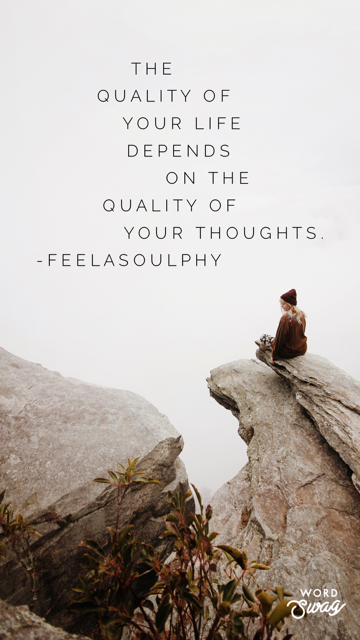



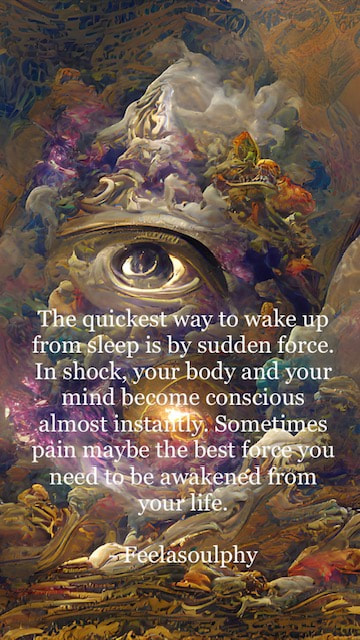
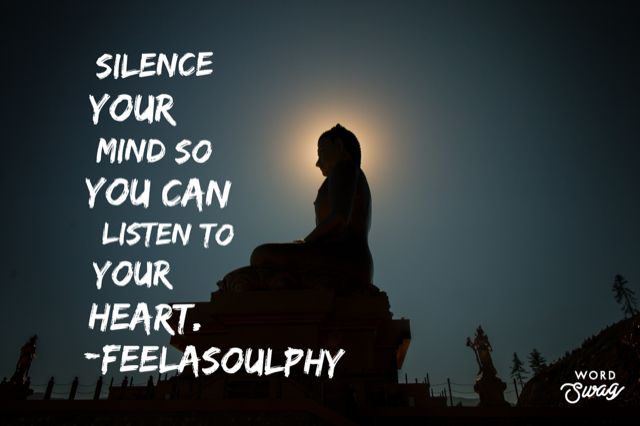
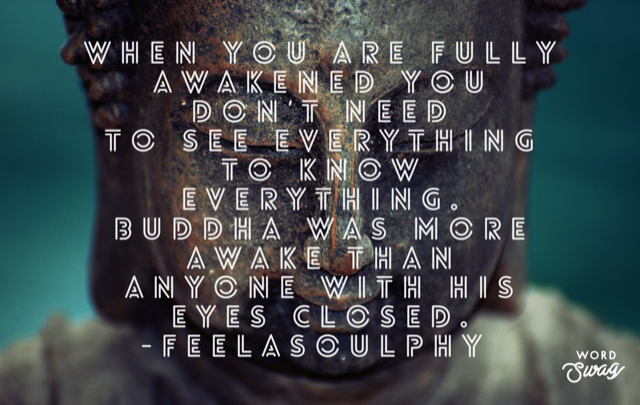
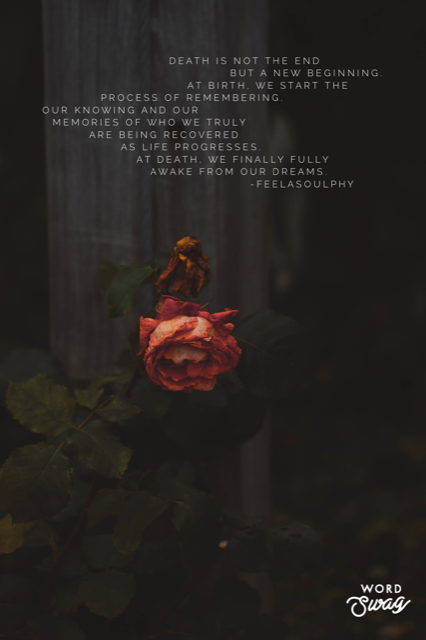
 RSS Feed
RSS Feed